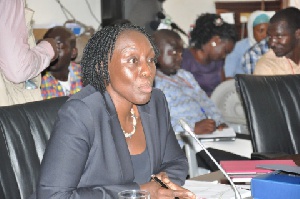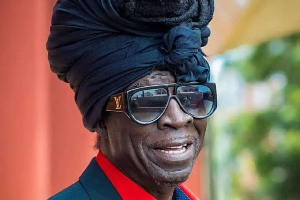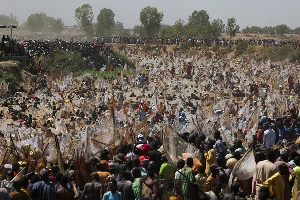Ghana Anti-Corruption Coalition (GACC) is demanding answers from government as to why it has not retrieved judgement debts declared as wrongful payments by the Supreme Court.
The coalition says it is incumbent on government to inform Ghanaians on the current status of recoveries to fully enforce the court order.
The GACC wants government to inform Ghanaians on the current status of the recoveries of judgement debts paid to Isofoton SA, $325,472; Waterville Holdings Limited, €25 million; and Mr Alfred Agbesi Woyome, GH?51.2 million.
Executive Secretary of GACC, Mrs Linda Ofori-Kwafo told The Finder that the demand is just one of the numerous events and requests targeted at government and state institutions that have not shown commitment in the discharge of their duties to fight corruption.
The request is coming ahead of the United Nations International Anti-corruption Day (IACD), which falls on December 9.
In July, the Supreme Court ordered businessman Alfred Woyome to refund a total of GH?51.2 million judgement debt payment he received between 2009 and 2010.
Judges at the highest court ruled that Mr Woyome had no valid contract to warrant the payment of that amount of money.
The ruling follows a review of the court's own earlier decision sought by former Attorney General Martin Amidu, who insisted that Woyome, like Waterville Holdings BVI Limited and Isofoton, had no valid contract to be paid any amount by the state in judgement debt.
In the first quarter of 2014, the Attorney-General and Minister of Justice, Mrs Marietta Brew Appiah-Oppong assured Parliament that her office had taken steps to enforce court judgements in the Martin Amidu versus Attorney-General and Waterville, as well as the Martin Amidu versus Attorney-General and Isofoton.
Mrs Ofori-Kwafo urged government to expedite action to retrieve every pesewa due Ghana.
She said the huge sums of money lost in the payments of avoidable judgement debts are of grave concern to many Ghanaians, especially when governments are unable to provide quality basic public services as a result of inadequate funds.
“Most appalling is the alleged connivance, and in some cases negligence of public officers, that led to the award of these judgement debts against the country.
“This is an effort to ensure that government honours its commitments to openness, transparency, civic participation and accountable governance under the Open Government Partnership Initiative,” she said.
Mrs Ofori-Kwafo explained that government must, as a matter of urgency, make public progress report on the Supreme Court order as well as challenges facing government in its bid to retrieve the money.
According to her, as the year comes to an end, government has a responsibility to inform Ghanaians as a way of assessing the country’s performance.
She noted that since the last commemoration of IACD in December 2013, Ghana has incessantly had challenges with issues bordering on corruption and allegations of corruption, commissions of enquiry into some allegations, and arrest of alleged corrupt public officials and court actions to challenge the payment of wrongfully paid judgement debts/settlement agreements.
She said an outstanding achievement towards the recovery of wrongfully paid judgement debts remains fresh on the minds of many Ghanaians.
General News of Thursday, 4 December 2014
Source: The Finder













